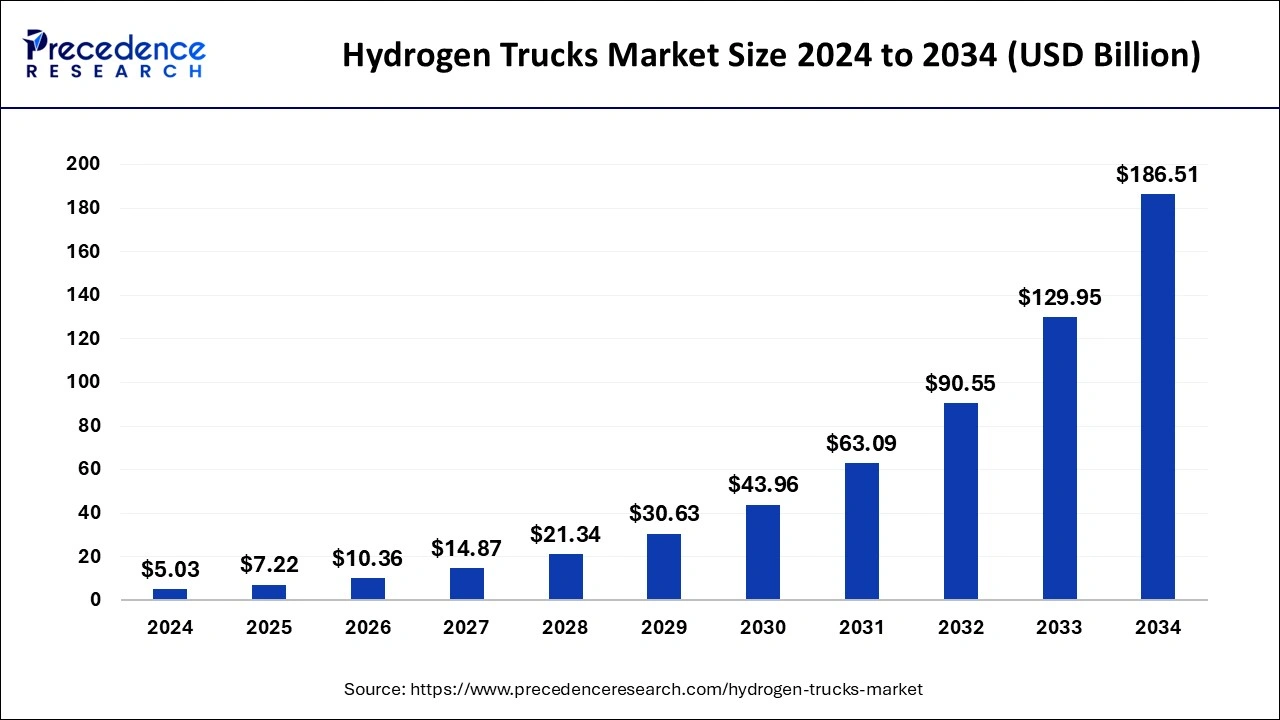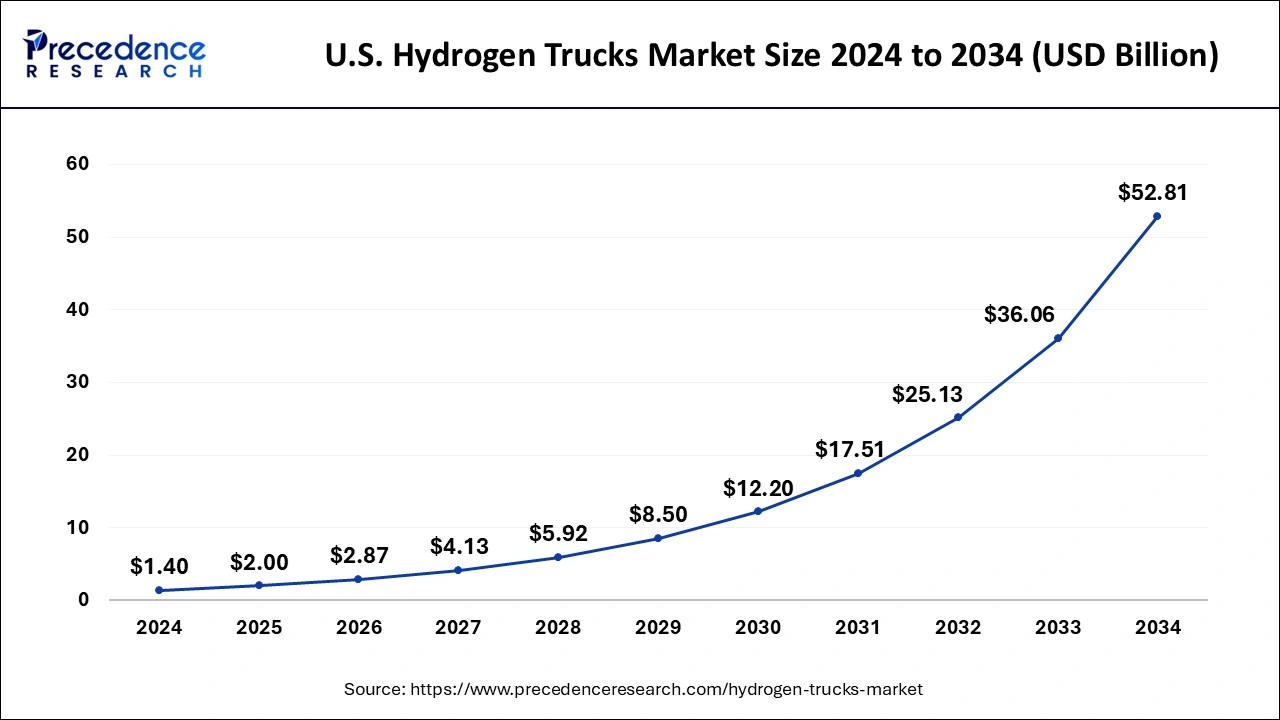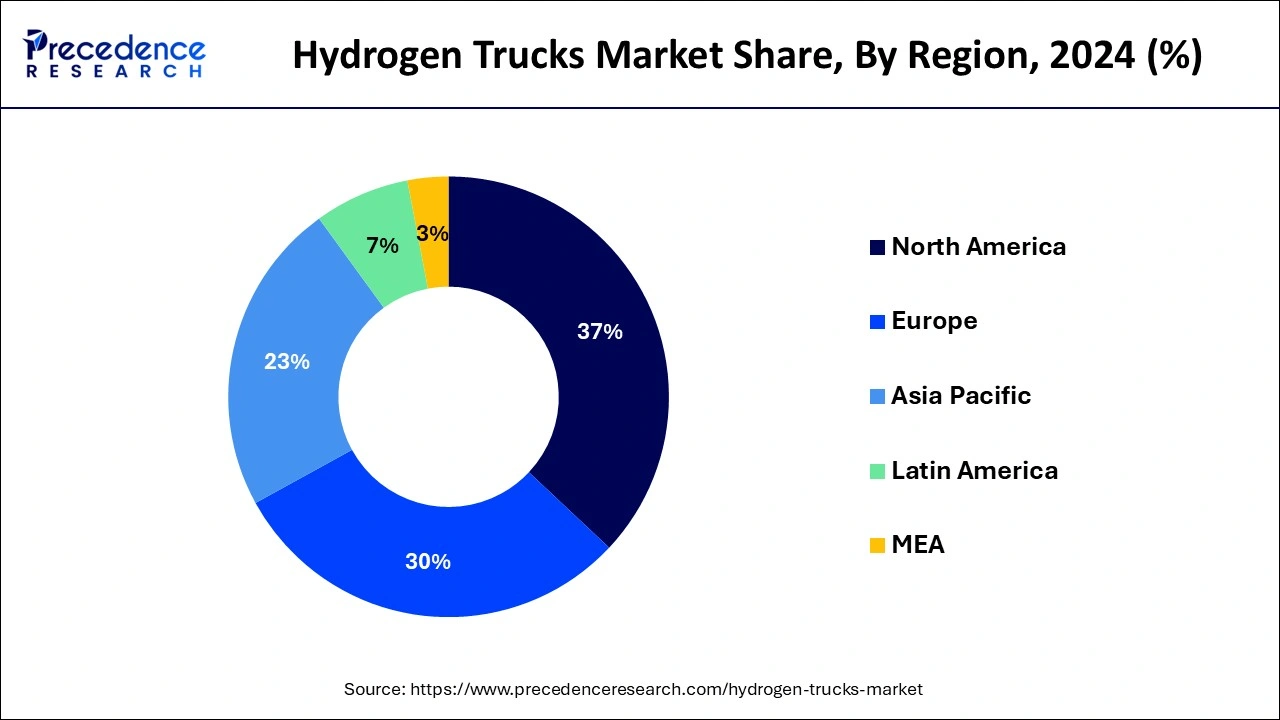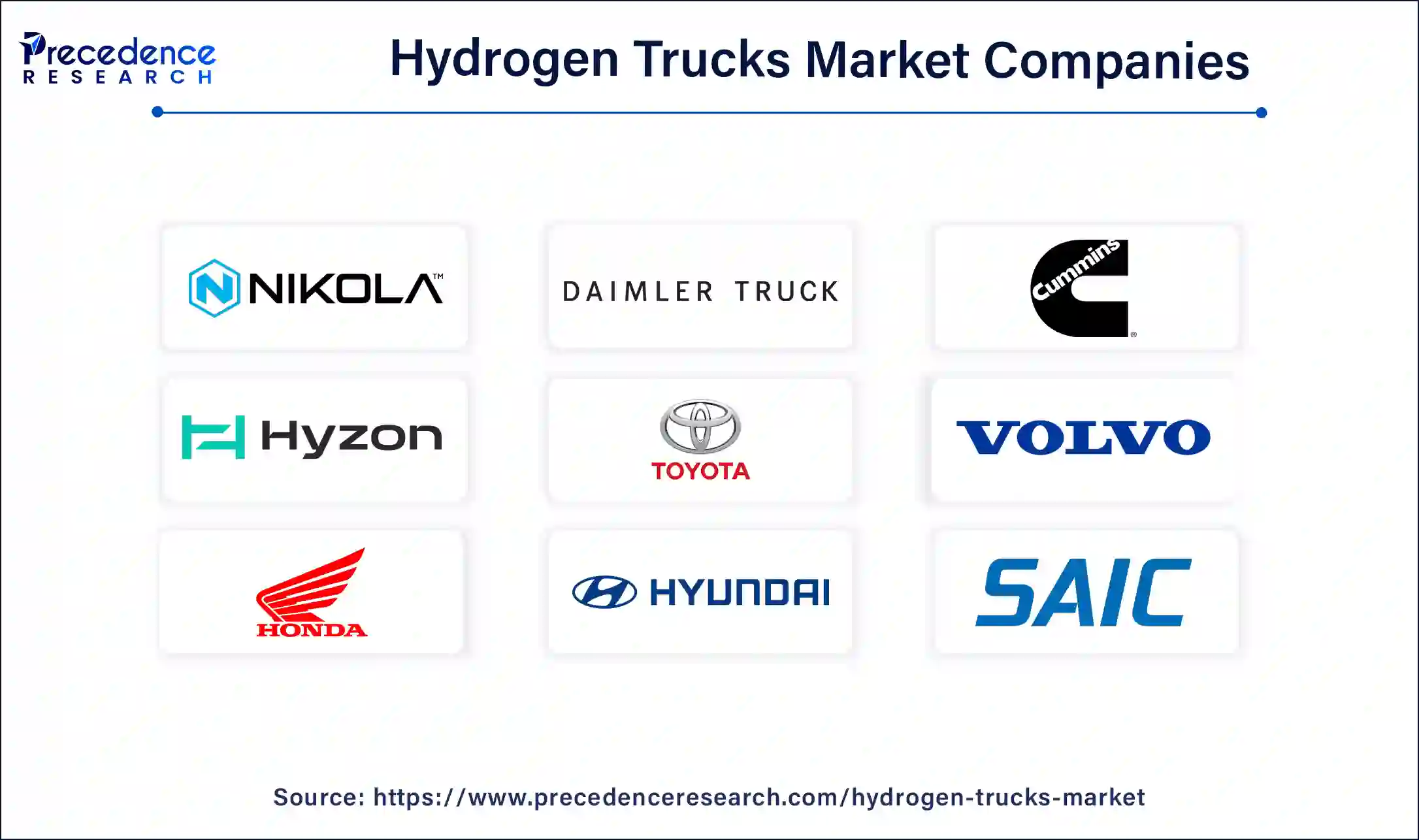List of Contents
Hydrogen Trucks Market Size and Forecast 2025 to 2034
The global hydrogen trucks market size was accounted for USD 5.03 billion in 2024 and is anticipated to reach around USD 186.51 billion by 2034, growing at a CAGR of 43.52% from 2025 to 2034. Hydrogen truck usage is growing significantly due to the efficiency of trucks and the focus on sustainability.

Hydrogen Trucks Market Key Takeaways
- North America dominated the global hydrogen trucks market with the largest market share of 37% in 2024.
- Asia Pacific is expected to expand at a solid CAGR during the forecast period.
Integration of AI in the Hydrogen Trucks Market
A significant advancement in the energy sector has been made possible by the recent integration of artificial intelligence. Fuzzy logic models, support vector regression, machine learning, and artificial neural networks are a few examples of artificial intelligence techniques and models that may significantly enhance the generation, storage, and transfer of hydrogen energy. Across many industries, artificial intelligence (AI) has changed the game, and the trucking sector is no different. AI is transforming how trucks drive on the road, from boosting safety and fleet management to streamlining routes and fuel economy.
U.S. Hydrogen Trucks Market Size and Growth 2025 to 2034
The U.S. hydrogen trucks market size was evaluated at USD 1.40 billion in 2024 and is predicted to be worth around USD 52.81 billion by 2034, rising at a CAGR of 43.76% from 2025 to 2034.

Daimler and Cummins are both the largest heavy-duty truck manufacturer in North America, the hydrogen fuel cells are a promising solution for the demanding requirements of heavy-duty trucking, in addition to this companies in North America are now re-evaluating their power solution options with consumers looking to increase their productivity, lower operations cost, regain facility space and eliminate or reduce electricity charges, the potential for hydrogen fuel cell forklifts is increasing with increasing awareness regarding environmental concerns, government initiatives and increasing concern on cost-effective things, there is a raising number of small and medium-sized enterprise that are expected to purchase hydrogen fuel trucks in the upcoming year.

The government of Canada is working on a clean energy future to strengthen the economy generates jobs and support workers in the natural resources sectors. Canada is also moving towards the usage of hydrogen trucks as they work on clean fuel standards, as it will require to use of lower levels of carbons in liquid, gaseous, and solid fuels for transportation, industry, and building.
Hydrogen is playing a key role in carbonizing hard-to-abate sectors like chemicals, steel making, and transport. The study concludes that fuel cell hydrogen (FCH) trucks could become cost-competitive by 2027 if hydrogen drops to €6/kg. It also touted the hydrogen trucks' "high operational flexibility and relatively short refueling times. “The 60,000 hydrogen trucks reflect numbers presented in a 2020 study commissioned by the EU public-private partnership Fuel Cells and Hydrogen Joint Venture (FCH JU), stating that fuel cells are an “emissions "It's a very promising solution for powertrains that don't have it." heavy truck industry. "
In India nation, the hydrogen mission was launched in August 2021, for scalp renewable electrolysis production and it's used in multiple sectors including transport.
Market Overview
Hydrogen fuel trucks are more efficient than diesel trucks as it saves fuel cost and operates with low noise, The fuel cell trucks produce less vibration from moving parts, making vehicles more efficient and quieter. The hydrogen fuel can travel longer distances with less refueling, making it ideal for fuelling heavy trucks and public transit buses that travel hundreds of miles at a time. The hydrogen truck is a form of alternative energy as it can run on liquid hydrogen. Many vehicles are running on hydrogen for example hydrogen-fuelled space rockets, cars as well as other modes of mobility. The energy released by hydrogen gets converted into mechanical energy through the reaction of Hydrogen with oxygen in a fuel cell to power electric motors.
The key advantages associated with hydrogen trucks are it includes technologies like Quick refilling time like gasoline as well as a high driving range on a single tank. Most of the truck industry runs their business on diesel, these hard-working vehicles deliver food and goods to small stores, retail shops, supermarkets, and distribution centers around the clock and form the backbone of the business. From switching diesel to hydrogen articulated and long-haul trucks can maintain a range of more than 1000 kilometers on a single tank, eliminating harmful emissions. By using hydrogen trucks carbon dioxide and harmful postulate emissions are completely eliminated and it helps in saving environmental pollution.
Market Scope
| Report Coverage | Details |
| Market Size in 2025 | USD 5.23 Billion |
| Market Size by 2034 | USD 118.1 Billion |
| Growth Rate from 2025 to 2034 | CAGR of 41.38% |
| Base Year | 2024 |
| Forecast Period | 2025 to 2034 |
| Largest Market | North America |
| Segments Covered | BY Product, BY Application, By Range |
| Regions Covered | North America, Europe, Asia-Pacific, Latin America, Middle East & Africa |
Market Dynamics
Driver
Advantages over traditional and electric vehicles
Hydrogen gas is used to run an electric motor in fuel-cell automobiles. In contrast, traditional vehicles that operate on gasoline or diesel, fuel cell cars, and trucks mix hydrogen and oxygen to generate electricity that also powers the motors. These vehicles are lighter than electric batteries, making them suitable for transporting heavy loads. These trucks can travel longer distances than battery-electric vehicles, making them suitable for long-distance haulage. Hydrogen fuel cell trucks can refuel as quickly as diesel trucks, unlike battery electric trucks, which take longer to recharge. The main consequences of converting hydrogen gas into electricity are water and heat. Nowadays, the continuous expansion of mass urban transportation, the implementation of severe emission rules, the rising demand for alternative fuel cars, and government assistance are important factors contributing to the demand for hydrogen trucks in the market.
Restraint
High prices of infrastructure & resources
Hydrogen stations and supporting infrastructure are very expensive to install as compared to oil, diesel, or other fuels. This has hindered the development of hydrogen fuel infrastructure around the world. Hydrogen is a highly flammable fuel and requires expensive equipment, protection, and safety measures. As a result, the cost of vehicles has risen, slowing the global adoption of fuel cell vehicles.
Opportunity
Focus on sustainability
The disadvantage of hydrogen trucks includes continuous emission of carbon dioxide wherever hydrogen is created through biogas, a capital cost burden, low energy content per unit volume under atmospheric settings, hydrogen decompression, and manufacturing, as well as the expenditure necessary to manufacture hydrogen. In addition to these problems, ecological worries over hydrogen manufacturing may stifle business expansion. Government and Environmental agencies are establishing severe emission rules and taking great initiative in raising environmental concerns, which helps to raise the production cost of fuel-efficient internal combustion engines. As a result, the new commercial vehicle diesel engine category is likely to develop slowly in the immediate term; they are offering a minor boost to consumption among fuel cell commercial trucks.
Product Type Insights
Heavy-Duty Trucks:Heavy-duty trucks are extensively used as compared to other product types, the heavy-duty trucks will continuously dominate the market for hydrogen fuel cell trucks, said by NaqiJaffrey, president and CEO of information trends, there is a particular industry interest in transitioning heavy-duty trucks to zero-emission rapidly because these trucks are the behest contributors to carbon emission on roadways. Heavy trucks continue to dominate the hydrogen-powered truck industry. In fact, heavy trucks are the largest source of CO2 on highways, so the industry is accelerating the transition to zero-emission vehicles.
Medium-Duty Trucks:Medium-duty trucks are mostly used for local deliveries and public services. The battery electric trucks will remain competitive for medium size hydrogen fuel cell trucks, it may include box trucks, dump trucks, tow trucks, flatbed trucks, and fire trucks. Medium trucks weigh between 10,001 lb and 26,000lb said by Jeffery, that battery electric trucks will become less competitive because many hydrogen stations are present everywhere and the prices of medium size hydrogen trucks fall.
Light-Duty Trucks: Light-duty trucks are mostly in car size and it contains pickup trucks, panel trucks, and postal vehicle. The smaller battery-electric trucks will have an edge over hydrogen fuel cell trucks until the early thirties. Mr. Jaffrey said small battery electric trucks will lose that edge as fuel cell trucks hit lower in price so because of this reason hydrogen stations becoming more pervasive.
Application Insights
Logistics:Clean logistics has secured 5,000 hydrogen-electric trucks from GP Joule through a framework contract. Delivery is scheduled between He 2023 and He 2027, and pre-series He is scheduled for the end of 2023. Clean Logistics turnover is in the billion-euro range in the low single digits, and many logistics and transportation agencies have loudly released projects to reduce their carbon footprint — simultaneously cashing in on economic and advertising gains. Today, hydrogen has ended up the strategic cornerstone of sustainability for the trucking enterprise. Both enterprise stalwarts and brand-new gamers to the enterprise have recognized this new possibility and all started an international roll-out of answers to take benefit of the marketplace and the authorities' incentives.
Municipal:Hydrogen trucks signs a preferred supplier agreement with bucher municipal, a global distributor of safe and reliable cleaning and cleaning supplies. Hydrogen can be used to power internal combustion engines similar to compressed natural gas (CNG) engines. Another solution is the use of hydrogen in fuel cells. This fuel cell produces electricity to power the vehicle. Hydrogen can also be used as an auxiliary fuel cell to extend the range of battery-powered electric vehicles.
Hydrogen Trucks Market Companies

Recent Developments
- In November 2024, For the research, small-series manufacturing, and customer rollout of 100 hydrogen fuel cell vehicles, Daimler Truck has secured €226 million in funding. Daimler's Wörth facility will construct the hydrogen-powered vehicles, and customer trials will begin in late 2026.
- In October 2024, within the next 18 to 24 months, Ashok Leyland, the Hinduja Group's Indian flagship, intends to commercially introduce its first hydrogen-powered vehicle.
Segments Covered in the Report
By Product
- Heavy Duty trucks
- Medium Duty Trucks
- Small Duty Trucks
By Application
- Logistics
- Municipal
By Range
- Above 400 Km
- Below 400 Km
By Geography
- North America
- Europe
- Asia-Pacific
- Latin America
- Middle East & Africa (MEA)
For inquiries regarding discounts, bulk purchases, or customization requests, please contact us at sales@precedenceresearch.com
Frequently Asked Questions
Ask For Sample
No cookie-cutter, only authentic analysis – take the 1st step to become a Precedence Research client